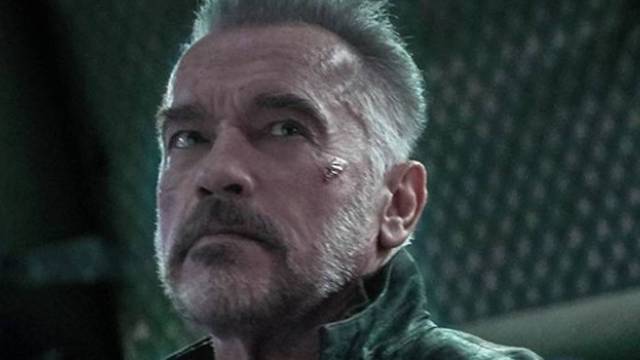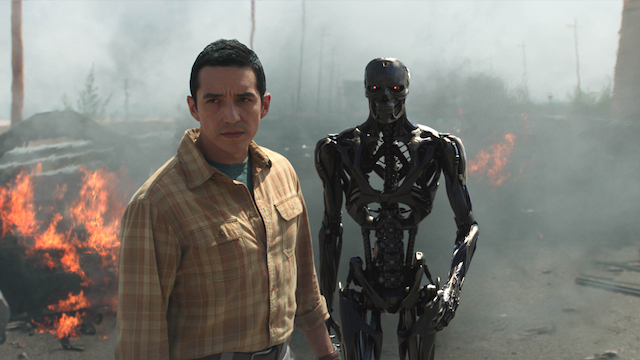Since its debut in 1984, the Terminator franchise has remained an anomaly. After creating perhaps the best one-two punch of all time with The Terminator and Terminator 2: Judgment Day, James Cameron went on to make some of the highest-grossing movies ever made. In his wake, Hollywood has attempted to catch the same lightning in a bottle time and time again. After three different attempts to recreate Terminator 2, the franchise seemingly ran out of steam in Terminator: Genisys. While each successive entry has drifted further and further away from Cameron’s original vision for the series, they have also been missing a key ingredient to the success of the franchise – Linda Hamilton.
In Terminator: Dark Fate, both Hamilton and Cameron make their triumphant returns. From the first frame, this film doubles down on its status as an immediate continuation of Terminator 2. Without spoiling anything, the movie begins with some stunning surprises and bold narrative choices. Essentially, it’s a soft reboot of the Terminator mythos in a way that may be problematic to some viewers. At the same time, it’s a necessary evil that allows the film to pay loving homage to the past while forging a new future.
Recapturing the Past

Tim Miller steps into the director’s chair for Dark Fate. And for the most part, he does an excellent job of emulating Cameron’s style. While Miller assumes that the audience is familiar with the first two films, he’s also able to add some flourishes of his own. Breakneck pacing in the first act also incorporates tons of homages to Terminator 2, both visually as well as audibly. More importantly, Miller is the first director since Cameron to successfully recapture the tone from the first two films.
Hamilton’s mere presence is the missing link in Dark Fate. Despite the optimistic conclusion of Terminator 2, Sarah is burdened by tragedy in this story. Sarah has always had a central place within the franchise, and the film smartly positions her as a continuing centerpiece. Especially compared to the events of Terminator 3, Dark Fate proves that there’s more of Sarah’s story to tell. Similarly, Arnold Schwarzenegger’s continuing presence in the franchise is appreciated. He even manages to give a surprisingly subtle performance.
Out of the franchise newcomers, Mackenzie Davis easily makes the most significant impact. Davis has proven her dramatic acting chops on shows like Black Mirror and Halt and Catch Fire, but Dark Fate confirms that she’s an absolute badass. Natalia Reyes is also a formidable presence in the sequel, even if the material doesn’t give her great material to work with. Gabriel Luna is another standout, thanks to his excellent physical performance as the menacing Rev-9.
The Franchise Awakens

Despite decent casting and direction, Dark Fate features recycled writing. With a story by Cameron, Charles Eglee, Josh Friedman, David Goyer, and Justin Rhodes, the script was ultimately written by Goyer, Rhodes, and Billy Ray. While the screenplay certainly captures a different narrative through-line, it’s also a mish-mash of recycled elements from the first two. Some of the characters are different, but many of the situations share a striking resemblance to Terminator 2. Even down to specific plot beats. Typically, any comparison to the first two would consist of high praise. In this case, the film manages to provide enough new elements to keep it from being too slavishly repetitive.
Much like the story itself, the Rev-9 is essentially a combination of the T-800 and T-1000. The franchise has had increasing difficulty topping the greatness of the latter. So this finds a happy medium to keep the villain fresh. Unfortunately, the film gives us hardly any time to invest in Dani before thrusting her into the story. While her morality gets explored, it’s never really established in the first place. There’s no doubt that Terminator: Dark Fate certainly primes Dani as the franchise-bearer moving forward. However, it never allows us the time to get emotionally involved in the way that we could with Sarah.
Old-School Action

Aside from this, Dark Fate signals a return for the franchise to old-school action. The visual effects are top notch, but it’s Tom Holkenborg’s music that truly impresses. Junkie XL’s Propulsive score is reminiscent of Brad Fiedel’s indelible themes in the first two films. Yet it also manages to be its own creation, while incorporating Spanish guitar influences among other elements.
As polished as the technical elements are, the emotional moments don’t quite land. Simply put,Dark Fate lacks the impact of the first two films. In many ways, the film reinvents the canon of the franchise, while adding some intriguing new overarching mysteries to the lore. However, some key plot points feel overly matter-of-fact in their treatment. Similarly, internal logic goes entirely out of the window at specific points in the film. Although Sarah delivers some great one-liners, her continued involvement in the story is also shaky at best.
Ultimately, Terminator: Dark Fate is the best entry since Terminator 2. It also proves that there’s still a little bit of gas left in the tank to keep the franchise moving forward.
Rating: 3.5/5




